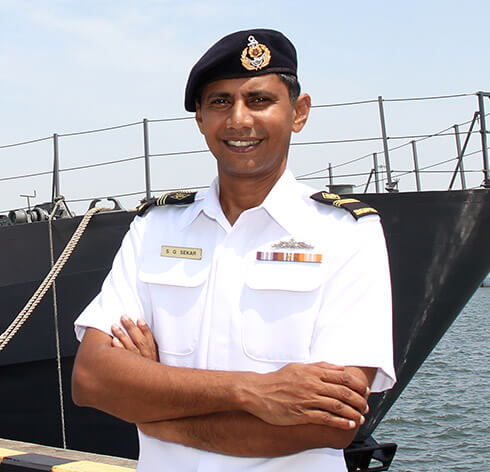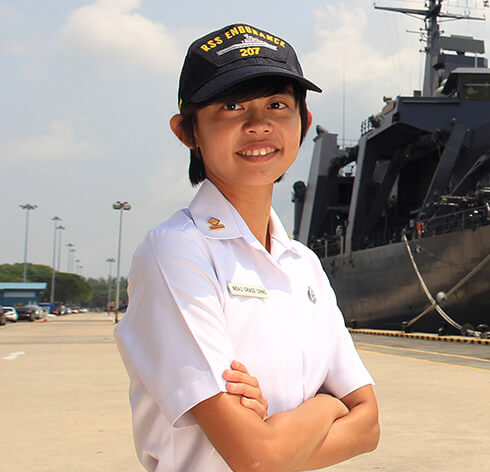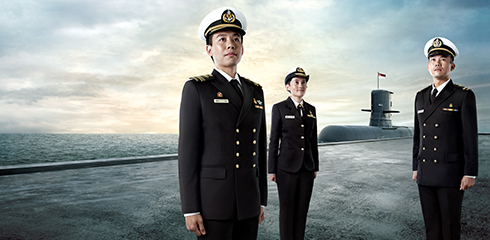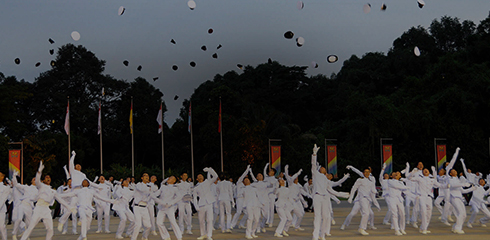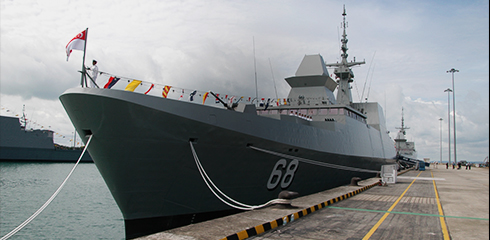Joining the RSN represented the opportunity to apply my passion for science and engineering in a unique environment, and work with interesting platforms and systems. It's not often that people come across a submariner, not to mention a submarine engineer.
As compared to a civilian engineer, being a military engineer fundamentally requires you to develop important leadership skillsets that are unique to our operating context. Even as an engineer supporting the SAF's operations, you may be required to lead men and women out in the field at the frontlines, or in my case, lead a team within a submarine crew in order to achieve a mission. At times, these men and women may need to trust you with their lives – you'll need to earn their trust and respect before a crisis, and build it up every day. It is this unique aspect of military leadership combined with engineering that drew me towards a career with the SAF.
Most importantly, joining the RSN allowed me to contribute to something bigger – there is no higher calling than defending our nation.
I lead a team of six submarine engineers and technicians that are responsible for maintaining the systems and operational readiness our submarine. I am responsible for their training, morale and discipline. Together with a crew of submariners, we operate and put the submarine through her paces, working together to keep her in an optimal condition throughout the deployment to ensure that we can achieve our mission.
The nautical seascape is relentless, and the underwater environment even more unforgiving. On board a submarine, the hull is the only thing that separates us from the immense pressures exerted by the ocean. Akin to a spacecraft, the crew becomes solely dependent on the submarine and her life-support systems for survival, from the atmosphere that we breathe, to the mechanisms that allow the submarine to return to the ocean's surface. Strict and robust controls over engineering and maintenance are absolutely essential to the safety of the submarine and her crew. It is part and parcel of our work as engineers and submariners.
Submarines are strategic capabilities that underpin the SAF's strong and credible deterrence. But a submarine is only as capable as the people that crew her. With a competent crew and reliable systems, a submarine is a force to be reckoned with; missing which, a submarine is merely a target.
When we are out at sea, submariners only have each other and our wits to depend upon. Close-proximity and the lack of privacy forces us to cohere. And because mistakes on-board a submarine can be catastrophic, trust and teamwork are key. Whenever we deploy, we embody the 'Navy Family Spirit' and the crew becomes a family away from home.
When I am out at sea, I often pore over pictures of family and friends back at home. They remind me of why I serve and whom we defend.
Every submarine diving officer remembers the first time they dived the submarine. When a submarine dive down, air is rapidly replaced with water to quickly bring the submarine below the water's surface and to become neutrally buoyant. As the Senior Marine Engineer, I also serve as the submarine’s Diving Officer, responsible for calculating and properly weighting the submarine before I open her flood valves for diving. If weighted too heavily, the submarine sinks quickly to the bottom of the sea. I do not remember Physics in the classroom being practiced at such high-stakes or with such an immediacy of consequences. No amount of training can fully prepare you for the burden of the responsibility involved in taking your first dive as a submarine diving officer – in the end, you just have to take a leap of faith in your people and in yourself. Nailing my first dive was the most nerve-racking and proudest moment of my career.
As much as it is satisfying solving technical and operational problems as an engineer, I have consistently found the most gratifying aspects of my work to revolve around people. It starts from putting emphasis into the training and grooming of people under your charge to be both technically competent in their work, as well as great leaders and team-players in their own respects. Seeing people grow and flourish with you, all culminating in us achieving something larger than the sum of our parts – these experiences represent the highlights of my career thus far.


